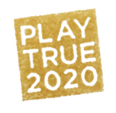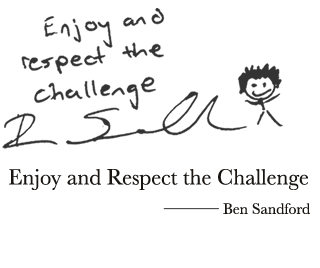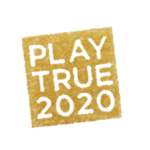




© Keita Yasukawa

Sport is full of challenges. The process of self-improvement involves difficulties that have to be faced to pass through. But by getting enjoyment out of that challenge, by being daring and resolute and overcoming, you get to discover unseen possibilities in yourself. Continuously challenging yourself is really what sport is all about.
Let me relate something that happened to me while active as a skeleton athlete. It was several months after a race where I didn’t come even close to getting a medal. In a training gym I happened to be with the Canadian athlete who had won the race. He said to me, “You were the real runner-up”, and in that way he praised the effort I had put in. It was all he had to say to get the message across.
By constantly and earnestly facing sport without cheating or taking shortcuts, you get to challenge yourself. And identifying with other athletes and the challenges they’re taking on ties up with having respect for the others. When it comes to going head-to-head with a rival in a match, it’s a relationship of respect. That is really important.
Sport has the power to bring together people of different cultures, environment, languages and countries. And the basis of that is, I believe, respect for others. In recent years, INTEGRITY has become an important topic in sport. It’s a matter of nurturing the spirit of athletic challenge, mutual respect, and the power of sport to bring people together. From this perspective, achieving clean sport and protecting the integrity of sport can be said to be very important issues.


© Cameron Spencer / gettyimages

New Zealand has a temperate climate, so winter sports are not popular at all. Until I encountered skeleton at age 22, I’d been actively exposed to other sports like cricket and squash.
Cricket in particular was the sport I put the most effort into at university, but at that time New Zealand didn’t have a national university cricket team. So I worked on getting a team selected. Then, another time, I heard that the world tournament for university squash was to take place in Austria. Looking into it, I discovered that New Zealand didn’t have any such teams either. So what did I do? You guessed it: I got to work on getting a team together as quickly as possible.
We managed to get accepted into the tournament, and our trip to Austria proved to be the launch pad for my career in skeleton.
Although my uncle had been skeleton world champion, New Zealand had no competitive skeleton scene to speak of, so up until my trip to Austria, I had little opportunity to try the sport. But when I first tried it in Austria, it really grabbed me. All of a sudden I was a skeleton convert and had no doubt at all that I had found something that I would devote myself for a long term.
There are times when you’re not in the kind of environment that will let you achieve what you want. Those are the times when you have to strike out on your own. You yourself have to be what gets things moving. Once you have latched onto a course of action, you have to then maintain a steady stance, whatever challenges you face, and see it through. Sport has taught me this and a lot more during my student days and through my competing in skeleton.

In 2014, I retired after twelve years competing and am currently active as a member of the International Bobsleigh and Skeleton Federation, the New Zealand Olympic Committee, and the Athlete Committee of the World Anti-Doping Agency. Besides that, I also get the chance to coach skeleton.
Skeleton itself is a solitary, individual sport, but competing in it would be impossible without the support of others. For twelve years, I could pursue my dreams with support from countless people. It is now the time for me to assist the next generation of athletes in achieving success.
“Face yourself earnestly.”
“Believe that you can achieve the goals you have set yourself, and put all yourself into achieving them.”
“Challenge your limits within the scope of the rules laid down.”
“Enjoy what you are doing.”
These, along with technical pointers, are the advice I give in particular to the young, new generation of athletes.
Sport has taught me a lot to date, and I want the men and women I come into contact with to also learn a lot through sport. I want to be a bridge between athletes and sport in order to further develop sport through the energy of those young athletes.
Furthermore, even in countries and regions with very little winter sport, you find dedicated winter sport athletes, however few. Such athletes have difficulty making themselves heard at the upper organizational levels, and, conversely find themselves in a situation where information about their sport is hard to come by. I found myself in similar circumstances while active in competition, so am confident that I can very much carry out a bridging role.
Being involved in the furtherance of sport by way of these new challenges is something I find both very meaningful and exciting.

© Keita Yasukawa

There are athletes passionate about sport, and people wildly enthusiastic about sport who are stirred by what athletes do. That relationship will no doubt remain unaltered into the future. However, unless sport remains clean, that relationship becomes clouded and deceitful.
For that reason, the organizations that control sport and those in positions of training young athletes have to make a sustained and ongoing effort to maintain that relationship. Because, however few in number, regrettably there will always be those who break the rules. Furthermore, regardless of the intensification of anti-doping activities, there are athletes who do not cooperate in doping control as much as they could. Anti-doping activities are in no way for the purpose of cracking down on athletes.
Our fundamental objective is to create an environment where all can compete according to the same rules, standing at the same baseline, and preserving the purity and true strength inherent of sport with no one taking shortcuts to the goal or cheating.
If anti-doping activities can further be reinforced, and not just the athletic community but the world in general can understand the purpose of them, then I believe the power of sport will infinitely be enhanced.
I want the young athletes who are the future of sport to have a strong sense of what is right and wrong and to put everything they have into their sport. I also want them to experience the enjoyment of following a path to achieve a clear goal that they have fixed their sights on, not just play sport.
My wish is to provide the kind of support by which such young clean athletes can make the right choices and focus on their sport. This involves both psychological and financial support, as well as organizational support in the form of fair rule creation.
I’d like to pass on to the next generation of athletes my own personal motto from when I was actively competing:
“Enjoy striving ever higher. Respect the spirit of self-belief and taking up the challenge.”

© Keita Yasukawa
INTEGRITY is required not only in sport, but on a personal level too. I, personally, had dreams as an athlete. Skeleton was a way of making those dreams a reality. In the end, sport profoundly influenced me in that it really developed in me a strong sense of integrity even though I was unable to get an Olympic medal.
“When you’re lying in bed in the morning, you wake up, get up, and never give up.”
These are the words of a certain Paralympic skeleton athlete. That athlete overcame difficulties that I couldn’t even imagine, and enjoyed sport in the face of such hurdles. And those words, so simple yet powerful, impacted me profoundly. He had difficulties doing just the things that those with all four limbs find simple; but he eagerly took up the challenge, faced life positively, and enjoyed himself. His words surely gave me courage.
While the conditions and environment I was in were different, I too threw myself into sport, taking on a variety of challenges. And for that very reason I can share that sense of challenge, and can truly respect him. Even if they’re not athletes, nor in a sporting situation, the respect I feel for others who take up challenges is an extremely important element in what forms my own sense of integrity.
Also, in the case of a general sporting tournament, athletes from different countries and regions compete, and there are situations where athletes from different sports interact. This awakens those involved to the need to perform and behave in a way fitting to representatives of their country, region or sport. Such a strong sense of responsibility is yet another important component of personal integrity.
My competing days are over and my position vis-à-vis sport is now different from that of an athlete, yet my journey in search of INTEGRITY through sport continues.



Familiar with cricket and squash from a young age; created a student cricket organization while a student at Victoria University of Wellington.
Inspired by his uncle, Bruce Sandford, world skeleton champion in 1992, to take up skeleton in 2002 at age 22, which he began in earnest.
Participated in three Winter Olympics, and achieved his personal best, a bronze medal, at the world championships in 2012.
Retired from competition in 2014.
Currently a member of the New Zealand Olympic Committee and of the WADA Athlete Committee , and in 2014 became the first Oceania representative to be elected as an executive officer of the International Bobsleigh and Skeleton Federation (FIBT) where he works to build an environment where current athletes can easily operate, and help them build post-competition careers.